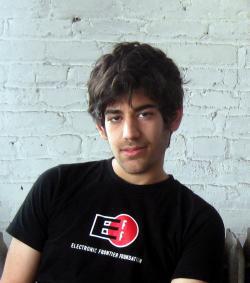Friends and supporters of Aaron Swartz gathered in the Cannon House Office Building Caucus Room in Washington, D.C., last night to memorialize his life—and to urge reforms to the Computer Fraud and Abuse Act, the law Aaron was indicted for violating. Attendees at the event included journalists, policymakers, influential activists, and members of Congress, like Rep. Zoe Lofgren, D-Calif., who has used Reddit to gather input on an Aaron’s Law proposal. But even among those gathering to remember him, there was a clear dispute over what Swartz’s legacy should be, and how best to pursue it.
That dispute was most audible when open-access supporters repeatedly interrupted Berin Szoka. When the president of the libertarian-leaning organization Tech Freedom suggested Swartz’s actions deserved some measure of punishment, others shouted in protest, saying things like “information belongs to everyone.” Rather than make him a “martyr” to information freedom, Szoka argued, supporters should consider Swartz a victim of prosecutorial misconduct and outdated computer laws. The interruptions ceased only when Taren Stinebrickner-Kauffman, who was Aaron’s partner for the last 20 months of his life and one of the event’s organizers, yelled for their silence.
Szoka then pleaded that those in the room—who included journalists, policymakers, influential activists, and members of Congress—to focus on CFAA reform that would appeal across the aisle. He asked for a show of Republican hands to drive home his point. But fewer than 10 people in the packed room raised them.
Other speakers included Sen. Ron Wyden, D-Ore*., and Rep. Darrell Issa, R-Calif. both allies of the CFAA reform movement and Swartz’s fight against SOPA and PIPA. Issa, who was not included in the program and was the only GOP member of Congress to speak, used part of his time at the mic to slam trust in the government.
The whole event had the air of a morbid political rally, albeit one aimed at repairing a system that many, including Stinebrickner-Kauffman, believe contributed to Swartz’s death. But, as the audience reaction to Szoka shows, defining a policy legacy for Swartz is a delicate process. His activism touched many people across many groups – so it’s not surprising there have already been a multitude of tributes outside the family-sanctioned call for CFAA reform, including academics posting #pdftributes, Anonymous DDoS attacks and hacks, and calls for MIT to commit to open access.
It remains to be seen whether the campaign to reform the CFAA will become the defining movement to emerge from this tragedy. But perhaps the diversity of these memorials is its own kind of tribute to the real Aaron Swartz: a complicated man who united disparate communities.
*Correction, Feb. 6, 2013: This blog post originally and incorrectly stated that Sen. Ron Wyden is from Washington. He is from Oregon.
